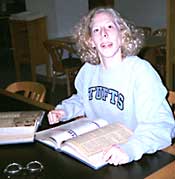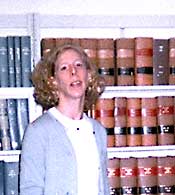Faces of the ADA
Jackie Okin -- "There is no question that, without the ADA,
I would not have been able to get a college education and pursue my dream of being an attorney."
Taking the Scholastic Aptitude Test (SAT) is a familiar rite of passage for high school students. Without the exam, it is almost impossible to get into college. Because Jackie Okin has cerebral palsy, she needed an accommodation to take the exam. She quickly learned that the SAT was offered on several dates for students not requiring an accommodation, but on only one date for her. So in 1994, the high school student from New York filed a complaint with the Department of Justice. The Disability Rights Section investigated and found that the SAT exams were being offered in a discriminatory fashion for persons with disabilities. The Educational Testing Service and the College Entrance Examination Board agreed to make changes in the availability of the SAT exam to students with disabilities. Jackie was able to take the exam and went on to graduate from Tufts University in 1999. She has completed her first year at the American University School of Law and wants to be a civil rights lawyer specializing in disability rights.
"I often take the ADA for granted and forget that my life would be completely different if the law did not exist. There is no question that, without the ADA, I would not have been able to get a college education and pursue my dream of being an attorney. Yet, the idea of not being able to accomplish these goals because of discrimination is a foreign concept to me because of the ADA. I was only thirteen when the law was passed. I have been extremely fortunate to grow up in a society where my rights have always been protected. However, as I have learned during the past few years of my education, where I have concentrated my studies on disability rights, few individuals were as fortunate as me. I have read and heard numerous stories of people who were discriminated against, socially isolated, and segregated because of their disabilities. I simply cannot understand why individuals have had to live these experiences. It does not make sense to me - I only know of a world with the ADA.
"Although I am aware of how fortunate I have been, I have not lost sight of the fact that discrimination against people with disabilities still exists in our society, even though it is illegal. Despite the tremendous strides that have been made in this country as a result of the ADA, there is still a great deal that needs to be done. I plan to be a disability rights attorney. Not only because I believe there is no reason for discrimination, but also because I feel a responsibility to ensure that others have the same opportunities that I had. I may never be able to personally thank all the people who are responsible for the passage of the ADA; perhaps if I am able to ensure that their legacy is maintained, then my gratitude will be sufficiently expressed.
"The future of the ADA is secure as long as people continue to work to enforce it. The ADA was passed because people with disabilities became more vocal. It is this voice that is the reason society is becoming more accessible - both physically and attitudinally. I am proud to be a part of this community in such an important and exciting time in history. I know that if we continue to work and move toward achieving the goals of the ADA, one day we will be able to say that this country truly is accessible and discrimination is a thing of the past."
July 26, 2000


